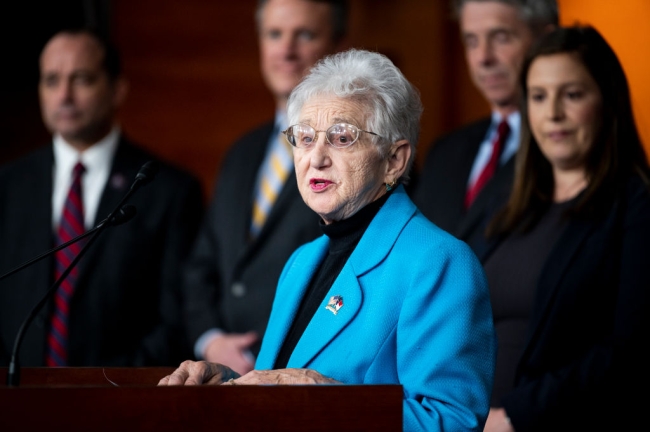You have /5 articles left.
Sign up for a free account or log in.

Expanding the Pell Grant to job-training programs is “an area of bipartisan cooperation on the committee,” said Virginia Foxx, the North Carolina Republican who chairs the House Committee on Education and the Workforce.
Bill Clark/CQ-Roll Call Inc. via Getty Images
With three different bills proposed that would allow students to use the Pell Grant for short-term programs of fewer than 15 weeks, the current minimum, momentum is building on the issue, and House lawmakers are beginning to talk about it informally. But muscling any legislation through this Congress will be difficult, advocates and lobbyists say.
Key lawmakers involved in higher education policy want to see the Pell Grant, federal financial aid for low-income students, extended to job-training programs, and the issue has been a focus of House hearings this year. The Biden administration also has signaled its willingness to talk about the idea.
“I’ve frequently said that if we’re asking our schools and districts to evolve, we need to evolve also,” Education Secretary Miguel Cardona said at a House hearing earlier this month. “I am interested in looking at ways to expand it to short-term Pell, with increased accountability to make sure that the students are getting a benefit from it. But I am open to it.”
Negotiations over short-term Pell have broken down before over whether to include for-profit and online programs. One of the proposed bills from a key Democratic lawmaker included for-profit programs—a move that advocates and lobbyists saw as a reason for optimism. A Democratic House aide said last week that negotiations have started, and they’re optimistic that they’ll reach a bipartisan agreement. A Republican committee aide said there have been informal talks but no formal negotiations yet.
David Baime, senior vice president for government relations for the American Association of Community Colleges, said Cardona’s comments at the recent hearing were encouraging, though he doesn’t believe the administration has a specific policy position on it.
“We are hopeful that something will happen this year, because we know that there is a strong commitment to doing this,” he said. “It’s just a matter of the principles working out in agreement. The details are important and somewhat complicated, but none of us think they’re insurmountable with the will to get the legislation enacted.”
Baime said low unemployment rates and labor shortages have sparked more interest in expanding the Pell Grant.
“Enacting this legislation would go a substantial way into amending that in a whole variety of areas that are high priority—tech and health care,” he said.
Baime said that expanding Pell Grants would help more students, especially those who are low income, access those short-terms programs, which can be expensive because of the technology and equipment requirements.
“Campus officials inform us that thousands of students are prevented from enrolling in these technical and career programs for financial reasons,” he said.
Baime pointed out that the workforce Pell programs would be subject to gainful employment, which would be a “powerful guardrail.”
The Proposals
Virginia Foxx, the North Carolina Republican who chairs the House Committee on Education and the Workforce, introduced her plan to expand the Pell Grant to programs at least eight weeks long earlier this year.
“Expanding Pell Grant eligibility to cover high-quality short-term programs, or what I refer to as workforce Pell, is an area of bipartisan cooperation on the committee,” Foxx said. “We must move away from the college-for-all mentality and prepare students for job opportunities in the economy of the future.”
Foxx’s Promoting Employment and Lifelong Learning (PELL) Act would require programs to show that they provide a positive return on investment for students and taxpayers, meaning the tuition and fees don’t exceed a student’s earnings with the new credential. The bill calculates the value-added earnings as the difference between the median earnings of students receiving financial aid and 150 percent of the federal poverty line.
All the proposed bills would expand the Pell Grant to short-term job training programs at least eight weeks long and lead to industry-recognized credentials. Both Foxx’s bill and the bill introduced by Virginia representative Bobby Scott, the top Democrat on the education committee, would open up short-term Pell Grants to for-profit programs. The third bill, proposed in the Senate, does not.
Virginia senator Tim Kaine, a Democrat, reintroduced the Jumpstarting Our Businesses by Supporting Students (JOBS) Act along with Republican senator Mike Braun from Indiana earlier this year. That bill, which is backed by several higher education and business groups, would exclude for-profit institutions and require programs to be approved by state workforce boards in addition to the Education Department and meet other requirements.
Representative Scott’s Jobs to Compete Act would require workforce programs to show that their graduates are earning more than a high school graduate in their state—similar to the proposed gainful-employment regulations—and have an earnings gain of 20 percent. Institutions also would have to show that they spend at least 50 percent of their revenue from tuition and fees on instruction, among other requirements.
Jennifer Stiddard, a senior fellow with the National Skills Coalition, which supports short-term Pell and endorsed Kaine’s bill, said the three bills will be the starting point for any negotiation, almost like a menu of options for lawmakers to consider.
“So this Foxx bill includes some things that we hadn’t necessarily seen before,” she said. “They have a proposal around what is essentially like a wage metric that is new. It’s interesting. I think it’s something that folks are still trying to look at and figure out whether or not that makes sense. It doesn’t include quite as many quite as voluminous … accountability metrics, as you see in some of the other proposals, so it is a bit more streamlined in its approach.”
Stiddard said extending the Pell Grant to shorter-term programs would fill a gap in the current system. Currently, she said students, institutions and other program providers are cobbling together different sources of financing, from state aid to workforce training dollars.
“What happens is you end up with this blending and braiding [of] funding that becomes not super predictable for the students and very difficult for the institution or the training provider to pool together,” she said. “What we would like to see is greater opportunity for students in the program to be able to access aid. Right now, we don’t entirely know how they’re paying for these programs.”
She added that the NSC doesn’t support access to any type of short-term program.
“We need to make sure that those are quality programs and there’s certain metrics in mind so that individuals who are putting in the time, effort and money in order to gain these credentials can actually have some type of economic benefits from them,” she said.
Rachel Fishman, acting director of education policy at New America, a left-leaning think tank, said the issue has generated a lot of enthusiasm on Capitol Hill, but she’s worried about the evidence base for extending the Pell Grant to short-term programs.
“The Pell Grant, which was really meant to fund higher education, is increasingly being used as a workforce tool when perhaps we have better vehicles for that,” she said. “Instead, we are pushing more and more colleges to fill that role.”
Fishman said there’s not much evidence the Pell Grant should be extended to programs between eight and 15 weeks, and that programs of only a single semester that are currently eligible for the federal grant don’t generally have good outcomes.
Thus, she said any bill should have guardrails built in to ensure that there’s not a sudden growth spike in the newly eligible programs. That includes not allowing online and for-profit programs to participate. Credentials should be stackable, or part of a sequence, so that students can work toward a higher-level credential. She also wants to see an earnings threshold similar to what’s in the proposed gainful-employment rule.
Fishman’s skeptical that a bill on workforce or short-term Pell will be passed during this Congress.
“This Congress is really, really hard,” she said. “I feel like we have a ticking time bomb with the default. I think they have a lot to do, and that’s way more important than this. We have like a few sort of crisis things happening that are outside the higher ed space that are crowding out any ability to get things done even within the higher ed space.”
Still, if any higher education–related issue did move, she said this issue as well as bills aimed at improving the accuracy and transparency of financial aid offers could be the ones.
More from Student Aid Policy







